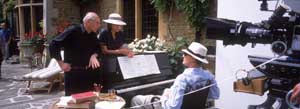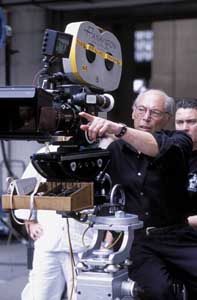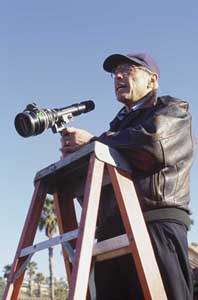-
- Court weighs gay Long Island man’s right to sue in partner’s death
- Key military specialists discharged under ‘don’t ask, don’t tell’
- Internet ads go after vice president’s lesbian daughter
- Massachusetts governor urges constitutional ban on same-sex marriage
- Study: Gays and lesbians over 50 involved in family caregiving
- San Francisco’s same-sex wedding march inspires documentarians
- Judge postpones hearing on women’s application for marriage
- Arkansas Pride continues despite protests
- National News Briefs
- World News Briefs
Arts & Entertainment
Let’s do it
Director Irwin Winkler talks about his new film, based on the oh-so-gay life of Cole Porter
Published Thursday, 01-Jul-2004 in issue 862
“In olden days a glimpse of stockings was looked on as something shocking, now heaven knows, anything goes…”
– from “Anything Goes”, by Cole Porter
The restaurant inside San Diego’s fashionable W Hotel is bustling with young, well-dressed people enjoying their pricey lunches — just the sort of tony spot Cole Porter would have enjoyed in his self-indulgent prime. Director Irwin Winkler (The Net, Life as a House) is here to promote his sixth and newest film, De-Lovely, a highly stylized, impressionistic look at the last 40 years of the beloved American songwriter (played by Kevin Kline), who left behind a treasure trove of timeless classics, including “Let’s Misbehave”, “You’re the Top”, “I Get a Kick Out of You” and “It’s De-Lovely”.
Unlike Night and Day, the white-washed 1946 Warner Bros. biography (starring Cary Grant) based on his life (“If I can survive this, I can survive anything,” Porter reportedly said after seeing it), De-Lovely doesn’t skirt the issue of Porter’s homosexuality. (A line in Jay Cocks’ script has Porter commenting, “I wanted every kind of love that was available.”) The articulate, silver-haired Winkler, 73, who has produced such film classics as Rocky, Raging Bull and The Right Stuff, wanted his version of Porter’s story to be more truthful to the man’s life — or at least as truthful as an American mainstream film about a gay musical icon can be.
“I saw Night and Day on television many times,” recalls Winkler. “I always admired the music, but I laughed at the story. I didn’t know a great deal about Cole Porter’s life, but I knew he was gay, and I also knew he was married. When I started finding out more about him, I got more and more interested in how a man who was so sexually active — he was not a man who had an occasional affair with another man, he was very active — [was able to] maintain his marriage [to socialite Linda Lee Thomas, played in De-Lovely by Ashley Judd] for so many years. I didn’t want to do another sanitized version of his life — I didn’t think audiences would accept it. I thought it was my responsibility to tell his story as honestly as I knew how.”
A commendable viewpoint, to be sure; but are cineplex audiences ready to see a film that shows its lusty male protagonist openly romancing, even kissing, other men?
“I haven’t gotten any negative reaction to it so far,” replies Winkler, who was thrilled by the standing ovation De-Lovely got at the Cannes Film Festival. “Everybody seemed very anxious to embrace the idea of an honest portrayal of the man’s life as he lived it. I think we live in an age now where there’s so much openness about all kinds of lifestyles that no one seems to be offended by [the idea of two men together]. Maybe in the Deep South somewhere they’ll question it, but even the conservative right has their own gay families. Isn’t Dick Cheney’s daughter a lesbian?”
When Winkler learns that one of the websites I researched about Porter called his marriage “a fake,” he bristles. “Cole and Linda were married for 38 years, and they were very happy, though they had their bad times, like any relationship. Maybe when it came to sex the marriage wasn’t exactly honest, but does a marriage have to rely strictly on sexual activity? As Cole Porter says in the film, the physical side of their relationship was pleasant enough, but he could take it or leave it. It was the intimacy he craved. So, on its own level, their relationship did work. It was not a conventional marriage, because Cole Porter was not a conventional artist.”
Throughout his career, Porter had affairs with a number of beautiful men. (“Both rough trade and gentle trade,” is how Winkler amusingly phrases it). By anyone’s standards, he was not a handsome man; how, then, was he able to attract so many good-looking partners? Winkler thinks he was a “magnet” because “he was so incredibly talented. He had great wit and great charm; he dressed well and lived well. He had money and wasn’t afraid to spend it. Yes, he was small, and he wasn’t the most handsome of men, but he was still attractive — everybody wanted to be with Cole Porter. He was the epitome of the Jazz Age. If you got a call from Cole Porter to join him for a dinner party, you dropped everything to go.”
Porter, who died in 1964, was considered a contemporary of Irving Berlin (a life-long friend), Richard Rogers, George Gershwin and Jerome Kern. But unlike many of those tunesmiths, he wrote both his music and lyrics — and was a Gentile. “Richard Rogers once said that it took a Wasp from Peru, Indiana [Porter’s birth place], to write great Jewish music. When you think of some of his songs, like ‘What Is This Thing Called Love?’ or ‘So In Love,’ they have a very Eastern European, Jewish sensibility. That’s true, by the way, of most of those composers. But Cole Porter wrote better Jewish music than they did.”
De-Lovely’s soundtrack features a host of contemporary interpretations of several notable Cole Porter songs, performed by the likes of such pop, rock and jazz artists (Porter fans, all) as Sheryl Crow (“Begin the Beguine”), Elvis Costello (“Let’s Misbehave”), Diana Krall (“Just One of Those Things”), Natalie Cole (“Ev’ry Time We Say Goodbye”) and Alanis Morrisette (“Let’s Do It, Let’s Fall in Love”). At the end of Morissette’s tune, Winkler shows two men dancing, two women dancing and a black man dancing with a white woman — “It’s all mixed up because it’s about everybody falling in love, and there are no limitations to who can fall in love,” he says, “I staged it that way specifically.”
The covers are performed with the utmost reverence. “They sing all the songs in a very traditional arrangement,” explains Winkler. “I had Stephen Endelman, our musical conductor and arranger, do them in the period tempos. So, although the songs are sung by pop stars, they’re not sung in the pop-star style.”
It’s astonishing just how racy many of Porter’s songs were, particularly for the time. “Let’s Do It (Let’s Fall in Love)” is unquestionably one of the most risque songs ever written. “Love for Sale” was banned from the radio for years, due to its saucy lyrics, while the word “cocaine” had to be changed to “champagne” in later versions of “I Get a Kick Out of You” (heard in the ill-fated Peter Bogdanovich musical At Long Last Love). “‘Don’t Fence Me In’, which we had to cut from the film, is a cowboy song,” says Winkler. “But what is it really about? ‘My Heart Belongs to Daddy’? Well, that’s a gay song. You can look at all those lyrics and they’re all very sensual, very sexual. ‘You Do Something to Me’? ‘Anything Goes’? They’re about sexual and personal freedom. One of the reasons his music has lasted so long is his music was much more personal than almost any other composer at that time. His sexual orientation made him a more personal writer, and that emotion came out in his music. Cole Porter was a man who loved sex, who loved writing about it, who enjoyed sending that message out without being overly public about it.”
Kyle Counts is the film critic for the Gay & Lesbian Times. De-Lovely opens at select theaters today.
|
|
Copyright © 2003-2025 Uptown Publications




